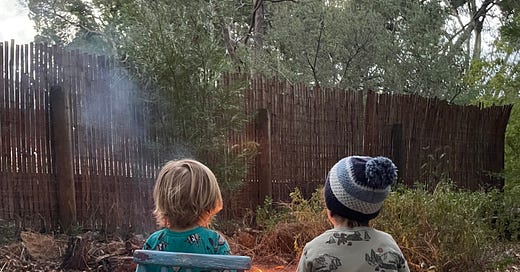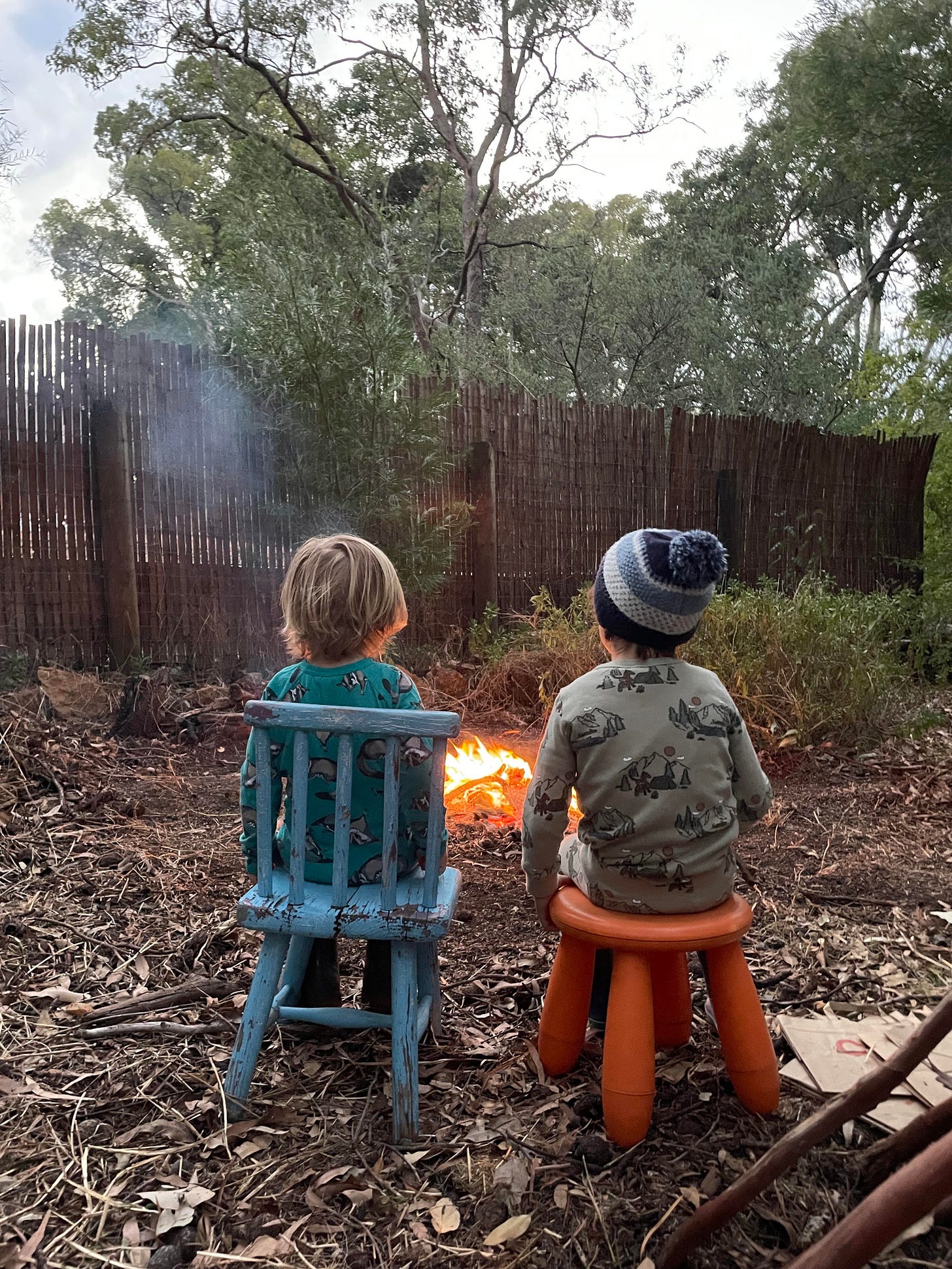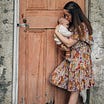We are the fire tenders
A reckoning with collapse, complicity, and the seeds of what must survive
Gabrielle
A few weeks ago, I spoke with Tessa from Mother Story Weaver. We met on Zoom, two strangers drawn together by a series of synchronicities and a shared knowing that something fundamental is coming undone. And perhaps too by the fact that her sons and my daughters are almost the same age. What might have been a casual conversation quickly became something else: a remembering, a reckoning, a fire passed from hand to hand, mother to mother. This piece is a continuation of that conversation.
At some point, amid the tumbling words, goosebumps and recognition, Tessa said something that made me pause:
"I don’t know why I’m so afraid of collapse when I actually want it to happen."
She spoke with a candour that left no room for illusions, naming the unbearable contradiction so many of us carry: the terror of collapse braided with a guilty longing for it. We fear the fall, yet deep down we know the world we have built cannot be saved. And a part of us aches for something truer to rise from its ruins.
Colonialism, capitalism, extractionism – these are not abstract forces. They shape every corner of our daily lives, offering comfort and convenience while cleaving us from our humanity and devouring the living world. For many, the collapse came with the arrival of these systems. Continuing to uphold them is not only untenable, it is a kind of madness, a collective moral failure we have normalised into what we call "business as usual."
We fear of the unknown, yes, but deeper still, we fear what collapse might demand of us: the resilience to endure it, the relinquishing of what we once relied on, the courage to truly face ourselves. We fear the confrontation with our own complicity, the recognition that we are bound to the very structures that now must fall. And when they do, we may not be the heroes of the next chapter. We may be the cautionary tale.
It is easy to be overwhelmed by this. It is easy to drown in guilt, in rage, in shame or despair. But guilt alone will not save us. Despair alone will not build what must come next. There is work to do, even now, and perhaps especially now.
We are not only witnesses to the dying flames of the old world, a world built on promises of hope and prosperity that have burned too hot and consumed too much. We are also the ones who must gather around the embers of what is worth carrying over and keep the flame alive: the old knowledge of how to live with the land and not against it, the memory of kinship over conquest, the songs, the stories, the ways of being human that were never about domination but about belonging.
We are the fire tenders.
And we are not the first to know this work. Long before this collapse, long before these systems built on forgetting, our ancestors tended fires not just for survival, but for remembrance. I look to my own lineages – to the old Celtic hearths and Norse halls – for signs of how to walk this path, for ways of remembering what was once known.
In the old Celtic world, hearth fires were more than warmth; they were sacred. Families kept the flame burning at the centre of the home, and to let it go out was seen as a kind of spiritual negligence. At Beltane, the fires of individual homes were ritually extinguished and rekindled from a single communal blaze, a symbolic renewal of life and belonging. In Norse tradition too, the hearth was considered holy ground, watched over by the goddess Frigg, keeper of the household and weaver of fate. These were not merely rituals of survival, but acts of continuity and remembering.
We are descendants of those who once knew how to live close to flame and soil and story.
We are being asked to remember again, and to tend to what still glows beneath the wreckage.
Tessa
I write in bed before sunrise, listening to trucks in the distance riding their noisy brakes down the hill as they carry their cargo to wherever the capitalist system directs them to go. I think to myself that I cannot wait until the fuel runs out, until the demand for empty consumerist goods dries up, until the systems that drive those trucks relentlessly fall, so that I might hear the birds instead of the endless reverberations of destruction.
I deliberately ignore the niggle that those trucks also carry the food that lines the supermarket shelves where I shop to feed my family. Do not mistake me for feeling prepared in any practical sense. I have only just begun to draw together a local, walkable community of families, a small gesture towards resilience.
Beyond that, I am nowhere close. I make lists. I talk. I write about the fact that the cornerstones our society hinges upon – the ones we call 'functional' – are collapsing around us. And I mean functional only in the sense that they work exactly as designed: extracting from the vulnerable and enriching those clinging to a deranged, detached sense of power. Not functional in any true or ecological sense, when you step back and consider what it actually means to be alive on this small, beautiful blue and green ball floating in space. When I look around, all I see is pure dysfunction and disconnection, in a world globally and individually hyperconnected in none of the ways that actually matter.
And so I wonder, who would not want this to fall? Who would not long for it to implode into itself, in the hope that something more real, alive, wild, and connected might emerge from the ashes?
All my life, I have felt the heavy pull of global inertia. As if the world were spinning faster and faster while everyone clings to their seats, pretending nothing is wrong. I sit apart, reeling in the knowing that this human train is headed for the cliff, and that, in my mind at least, I have already jumped.
Yet still I sit in a spacious carriage, surrounded by food, water, safety, beauty, entertainment. My conscious mind knows what fuels this luxury: the blood and suffering of millions of people, the destruction of ecosystems, the perversion of ways of living that once would have felt right to us. I have never wanted that blood on my hands, and yet there it has always been, as a child of the capitalist, consumerist patriarchy I was born into.
"Out, damned spot," cries Lady Macbeth as she sleepwalks, trying to scrub away the blood she cannot wash off, the moral stain of the violence she helped unleash. She believed she could take the power without the cost; that she could escape the consequences. She was wrong. And so are we. The same stain runs through our lives, mostly invisible, but everywhere comfort is built on the suffering of others.
I think again about the life so many of us long for, the life that waits beyond emotional inertia and beyond the maddening cognitive dissonance. I imagine a life beyond the status quo and tap into my yearning for true community, real connection, harmony with the land I live upon.
Though it may seem naïve to view collapse through rose-coloured glasses, and perhaps it is my privilege peeking through – I will own it – I get excited by the idea that we are about to be thrown off the cliff and into the greatest adventure of our lifetime. It will not be comfortable. More and more of us, especially our children and grandchildren, will experience the suffering, loss, and pain of a world whose global systems are no longer harnessed for our benefit. The unpredictability and harshness of our environments succumbing to climate change will make life difficult, and perhaps impossible.
Perhaps we will all perish in this Great Unravelling of humanity’s selfish greed. But perhaps, as Sarah Wilson reflects, drawing on Jonathan Lear’s idea of radical hope, collapse might yet crack open a future goodness we cannot yet conceive – a deeper, truer way of being human, rising from the ashes of what must be left behind.
And I want that. I long for that. I want it for my babies. I want them to thrive, but only with their humanity intact.
Yes, I am scared. I cannot fathom a world where my children suffer. What parent can? But why should we continue to benefit at the expense of millions of others? Who are we to believe we have a right to such privilege? What does this privileged life truly cost our souls?
Maybe, along this journey, we will find real connection outside the small black rectangles we carry like magic amulets, promising protection, wisdom, health, love, and joy. This idea excites me too. We have been brainwashed into believing that a degree, a job, a car, a house, a marriage, a baby, a holiday, and a retirement are the purpose of life. Collapse flips those myths upside down, and for most of us, it is too much to hold, too much to hold while continuing the motions that keep the very systems holding us hostage alive.
And so we cling to inertia. We cling to our dysfunctional inability to change, to see what is unfolding around us, hoping the comfort we have lucked into will somehow continue, hoping that business as usual will survive. But some of us simply cannot.
And to those, I am here to say: welcome.
Welcome to the next chapter of your life, where the birds sing louder than those damned trucks, where our babies’ giggles steal back our focus, where we leave our phones inside while we play in the dappled light of old grandmother trees.
Welcome to waking up, to the beauty and the pain of watching the world fall apart, and to the feeling of something deep inside you falling back together.
Welcome to wholeness. Welcome to the death of the lies that kept you quietly sick.
Welcome to the fire.
Let us not extinguish this necessary flame. Let us stoke it with life, with adventure, with resilience, with rage against the system that kept us caged for too long.
Let us walk forward with eyes wide open and arms outstretched towards collapse. This is not just for the 'woke', it is an awakening of a different kind. An awakening to yourself, to your humanity, to your yearning for true local community, and to deep connection with the land, wherever you find yourself on this big, beautiful blue and green ball floating in space.
Bring it on.








Can’t tell you how much I needed to read this!! I’ve recently given birth to a precious baby girl who I love more than I knew was possible and I’m terrified. I wake up each day full of love but with a pit in my stomach of the world she’s inheriting, of the uncertainty. I have hope and I need to hear these conversations, especially since everyone around me is acting like everything is normal. Thank you for writing this!
I used the phrase Bring it on when talking about collapse a few years ago and was roundly chastised for my privilege, callousness and nativity - which I did and do understand and so have not mentioned since. This is a crystal clear articulation of what I had been fumbling towards and I am so appreciative. I am fortunate to have a small group locally that do discuss adaptation to collapse so I will point them to this.